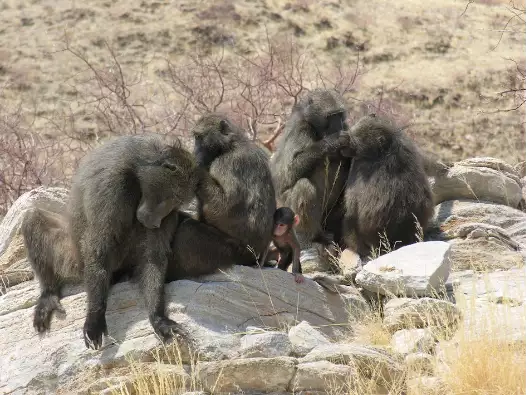A groundbreaking study has upended decades of assumptions about power relationships in primate societies, revealing that the notion of the dominant “alpha male” is actually rare rather than the rule. The comprehensive research, published July 7, 2025, in the Proceedings of the National Academy of Sciences, analyzed data from 253 populations across 121 primate species.
Scientists from the University of Montpellier, Max Planck Institute for Evolutionary Anthropology, and German Primate Center spent five years compiling detailed records of who fought whom and who won in primate conflicts. Their findings paint a far more complex picture of male-female power dynamics than previously understood.
“Clear dominance by either males or females is uncommon,” says Elise Huchard, lead author from the University of Montpellier. The data shows that in 70% of studied populations, there was only moderate or no significant sex bias in power.
Strict male dominance, where males win over 90% of conflicts with females, was observed in just 17% of populations with quantitative data – only 25 out of 151 groups. Clear female dominance was found in 13% of populations, or 16 groups.
The research team also discovered that aggressive interactions between males and females are surprisingly frequent, accounting for nearly half of all aggressive encounters in social groups.
“The observation that in most populations any given individual is more likely to be involved in a fight against another individual of the opposite rather than the same sex highlights that the battle of the sexes is common in other animals,” explains Dieter Lukas from the Max Planck Institute for Evolutionary Anthropology.
Previous scientific assumptions often portrayed male dominance as the default state in primates, with female-dominant species like ring-tailed lemurs or bonobos seen as rare exceptions requiring special explanation. This study flips that view, showing that most primate societies exist in a middle ground where power is more balanced or context-dependent.
“Recent research started to challenge the traditional views of male dominance being the default status, and our study now provides a more comprehensive exploration of variation in intersexual dominance relationships,” notes Peter Kappeler from the German Primate Center.
The researchers identified several key factors that influence which sex holds more power. Female dominance is more common in species where females are monogamous, similar in size to males, or primarily forage in trees. These conditions give females more control over mating choices.
Female power also increases in situations where females face intense competition over resources, such as in solitary or pair-living species, and when mother-offspring conflicts pose lower risks to dependent young.
Male dominance, meanwhile, is more prevalent in terrestrial species, where males have larger bodies or specialized weapons like large canines, and in species where males mate with multiple females.
Similar Posts
The research reveals fundamentally different paths to power. “While primate males gain power via physical force and coercion, female empowerment relies on alternative pathways, such as reproductive strategies to gain control over matings,” Huchard explains.
For example, in bonobos, less obvious signs of ovulation allow females greater choice in partners, as males cannot easily determine when females are fertile.
The findings challenge the traditional view that human patriarchy is an inevitable legacy of primate ancestry. The researchers suggest human traits align more closely with species exhibiting balanced or flexible dominance rather than rigid male hierarchies.
“These results corroborate quite well with what we know about male-female relationships among hunter-gatherers, which were more egalitarian than in the agricultural societies that emerged later,” Huchard observes.
This research has significant implications for understanding the evolution of social behavior across animals and sheds light on human social dynamics. By revealing that most primate societies lack clear-cut sex biases in power, the study suggests that gender roles and dominance patterns are shaped by ecological and social contexts rather than fixed biological templates.
As the scientific community continues to digest these findings, one conclusion is clear: the “alpha male” is the exception, not the rule, in the primate world – requiring us to rethink longstanding assumptions about the natural origins of power hierarchies.



















